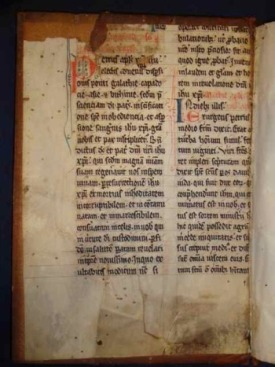"Elect Exiles" -- 1 Peter 1:1-12
 Tuesday, February 2, 2016 at 10:18AM
Tuesday, February 2, 2016 at 10:18AM 
The First in a Series of Sermons on 1 Peter
Presumably, most of us are US citizens–either by birth or by naturalization. American citizenship entitles us to all the benefits and privileges of living in the United States. Yet, our national citizenship also carries with it the responsibilities of being an American–we vote, we pay taxes, we may be called to serve in the miliary, etc. But in addition to our US citizenship, Christians possess another kind of citizenship. If we trust in Jesus Christ and possess the Christian passport (baptism), we are also citizens of Christ’s kingdom–we hold a dual citizenship. Just as our natural citizenship provides us with certain benefits, and places certain responsibilities upon us, so to does our citizenship in Christ’s kingdom. The purpose of Peter’s first epistle is to spell out both the privileges and responsibilities of our membership in Christ’s kingdom, even as we dwell in the midst of the civil kingdom with its many blessings, its numerous duties and obligations, and its soul-threatening dangers.
We begin a new series on three of the seven so-called “catholic epistles” or “general epistles” found in the New Testament. The three epistles we’ll be covering in this series are 1st and 2nd Peter, along with Jude. The reason why these letters (along with James and the three epistles of John) are called “catholic” or “general” epistles is because they are addressed to Christians in general, and are not addressed to specific individuals or churches as is the case with the letters of Paul. The general letters come out of the very heart of the apostolic circle: Peter–the chief apostle; James the half-brother of Jesus and the leader of the Jerusalem church as well as one the first Christian martyrs; John–the author of the gospel bearing his name, three epistles and the Book of Revelation; and Jude, another half-brother of Jesus. So, the general letters are very important if too often overlooked.
Reformed Christians often view themselves as students of Paul–because in our own history the doctrinal debates we have faced often deal with the question of how sinners are reckoned as forgiven and righteous before God (justification). Our theologians write books on Paul and especially his commentaries on Romans and Galatians–with good reason. We need to properly understand the gospel in order to share it with others, and to live in light of the countless blessings secured for us by Jesus Christ. While the battles over justification are important, and we do need to be thoroughly conversant with Paul and his letters, I suggest that American Christians must now also fight on a second front–the ever-growing challenge of secularization. The two letters of Peter and the short letter from Jude provide first century Christians with very specific instructions about how Christians are to live as exiles in a foreign land. For the original recipients of these letters, this meant the diaspora of the Greco-Roman world of the first century because the Christians receiving this letter had been forcibly removed by Roman authorities from the cities in which they had been born and raised.
While I am at home in the land of my birth and find much here of value and joy, as I get older I am also aware that the land in which I live is becoming increasingly hostile to the things I believe about the meaning and purpose of life, the values I hold dear, as well as those things I believe as a Christian as expressed in the Apostles Creed. In many ways, I feel like a foreigner in my own country–not a foreigner in the sense of race, custom, or culture, but a foreigner in light of how my neighbor sees the world, how they live their lives, what they think important, and how they make decisions about right and wrong. I simply do not believe the same things about the meaning and purpose of life which most of my neighbors do. Part of the reason is I have a dual citizenship and they do not.
To read the rest of this sermon: Click Here


Reader Comments